📍 Why does Seong-je burst into maniacal laughter even after getting stabbed in the foot with his glasses? I’ve analysed every clip of this untamed wolf and distilled my thoughts into this essay post. I’m keeping visuals to a minimum here—this is purely a deep dive into the psyche of one of K-drama’s most complex antagonists.
Wolf Who Laughs Through Pain
While binge-watching Season 2, I found myself interpreting Seong-je not as a simple villain who exists solely to torment the protagonist, but as a psychological mirror reflecting the guilt-consumed boy staring back at him. Let me unpack that interpretation.
When Si-eun gets forcibly transferred to Eunjang High School, Season 2’s narrative weight becomes significantly heavier. Here’s a boy carrying all the trauma from Su-ho’s coma like a physical burden crushing his shoulders. Park Ji-hoon isn’t just acting out trauma—he’s embodying a kid who’s built walls so high that even he can’t see beyond them anymore.
But in this jungle-like classroom environment, while bullies like Hyo-man keep prodding the boy, three new friends manage to penetrate his defences without the protagonist even realizing it’s happening.
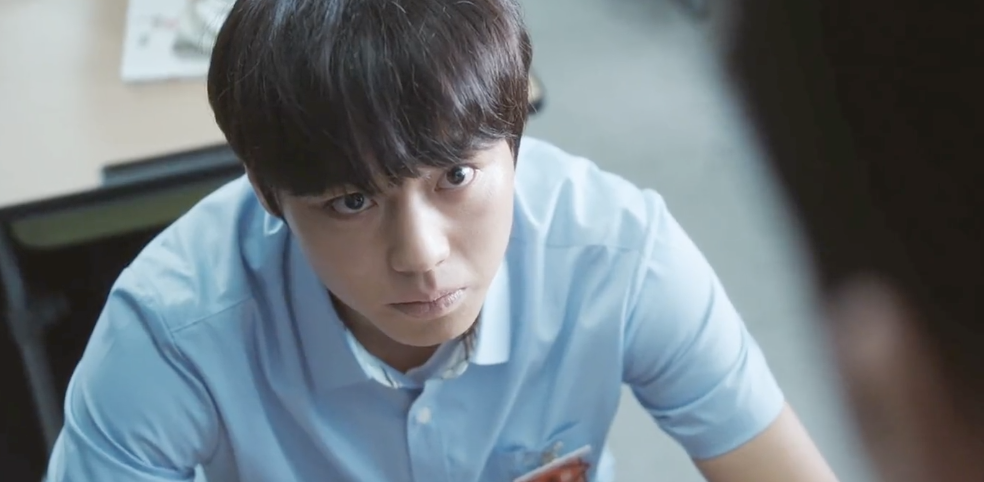
The contrast between seasons offers fans a genuinely engaging viewing experience. Season 1 captured the raw sensibilities of an all-boys high school with watercolour-like cinematography and an atmosphere that felt authentically lived-in—something you might encounter in everyday life. It portrayed the subtle hierarchy culture among teenage boys in what I’d call “undiluted pastel tones.”
Yeon and Geum fight
Season 2 took a markedly different directorial approach. It became more faithful to the school action genre, with fantasy-adjacent characters like Baku stepping boldly into the spotlight. Action sequences increased in proportion, and that iconic rooftop fight between two unhinged boys—what fans call the “YeonGeum fight”—delivered a proper adrenaline punch.
I’m not alone in this observation: other viewers have confessed to playing Season 2, not Season 1, like a comfort playlist when they need to decompress. The reason is probably the warmth and humour that the so-called“Baku family” brings to the table. Season 1 demands your full emotional investment from episode 5 onward, and episode 7—where Su-ho falls into a coma—is genuinely difficult to watch without emotional exhaustion.
So Class 2 functions as both comfort food and comfort viewing for the Weak Hero fandom.
The Enigma That Is Seong-je
This untamed wolf is completely addicted to dopamine. He games on his phone all day, chain-smokes, looks for fights—constantly stimulating his brain. Seong-je seems to have reached a stage where he genuinely enjoys the adrenaline rush from getting hit. Rather than simply trying to avoid damage, he truly savours getting hurt during fights.
I honestly can’t imagine anyone other than Lee Jun-young pulling off this untamed wolf—he was perfect for the role. The synchronisation between actor and character felt like it exceeded 100%. Even in the original webtoon, Seong-je was always portrayed as intensely charismatic, but Lee Jun-young brought something special to the screen adaptation.
The entire cast unanimously agreed during their group theater viewing before the Netflix release that Geum Seong-je was incredibly captivating. Lee Jun-young’s natural ability to embody both the character’s violent exterior and his underlying romantic nature made him irreplaceable for this role.
In every single scene where Seong-je faces Si-eun, he’s smiling. To him, the boy isn’t just entertainment—for someone who’s grown bored with most things around him, Si-eun represents a major new dopamine source.
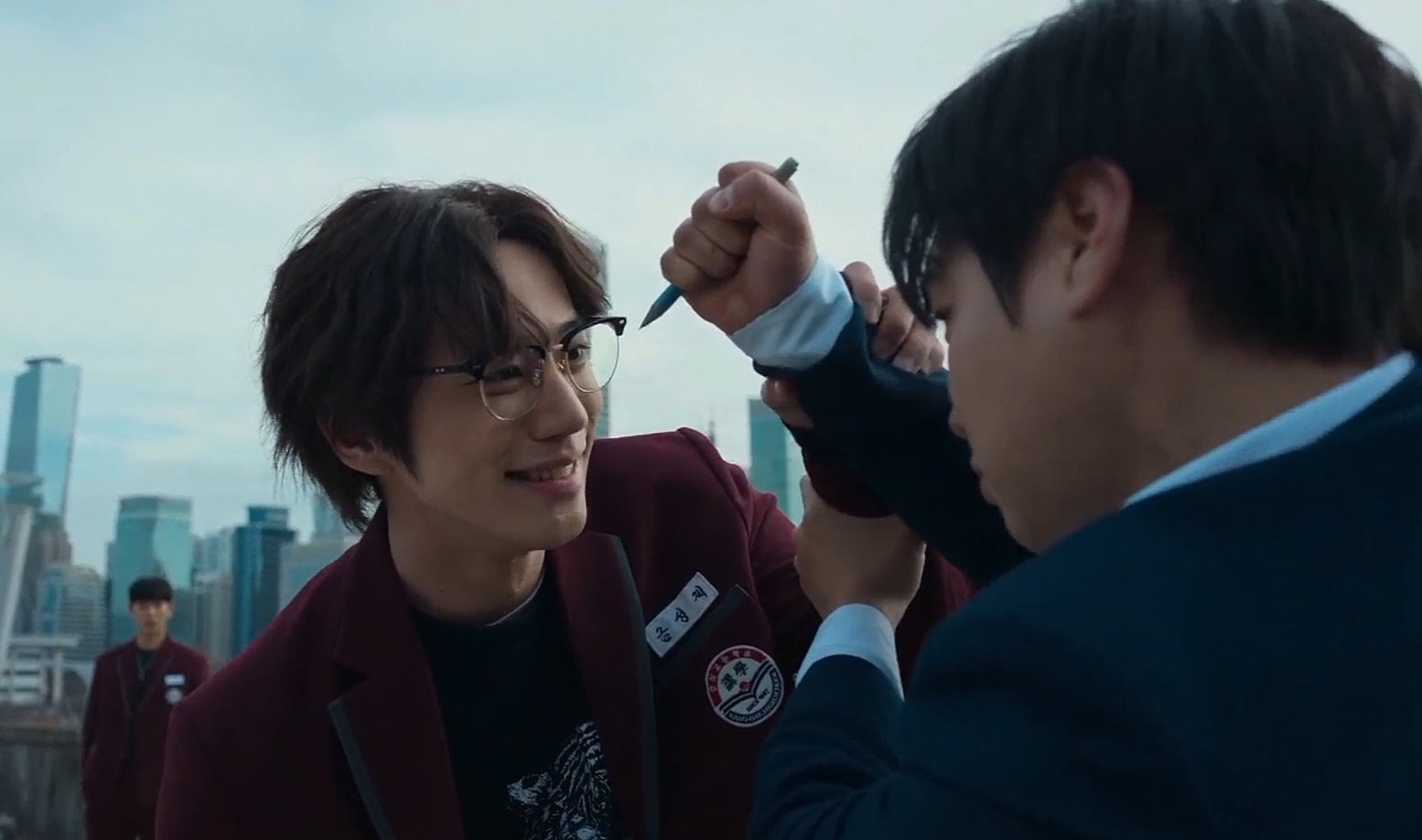
A detail I love
Remember when the wolf figures out in the bathroom that Si-eun has exceptional dynamic vision, then later on, the rooftop covers the protagonist’s line of sight with his palm? That’s my favourite fighting detail in the entire series.
In that rooftop showdown, when Si-eun tries to stab with the pen, Seong-je blocks it with one hand, but the smaller boy desperately uses both hands trying to penetrate his defense. The small boy is deadly serious; the big boy is grinning.
Since the wolf is physically larger, he’s always looking down at Si-eun, and whenever the protagonist’s around, those corners of his mouth inevitably curve upward. The tone when Seong-je calls him “newbie” sounds half condescending, half like a signal saying ‘I’m genuinely fond of you.’
I completely understand why Seong-je says he wants to beat the hell out of Si-eun’s face. This pretty-faced kid has the audacity to stare defiantly with those deer-like eyes—completely different from other students who just shrink back. Throughout the series, Si-eun becomes the villain’s primary source of dopamine and adrenaline stimulation.
Then, when small-framed Si-eun loses his pen too easily to Seong-je’s superior strength, he deliberately lures his opponent toward the rooftop wall, uses the flower pot, steals the glasses, and stabs his opponent’s foot—adrenaline explodes, and you can’t help but cheer. When no one could have predicted Si-eun’s reversal, this pretty boy, as Seong-je noted, turns the tide with his natural intelligence and composure.
Thats it
So when Seong-je gets stabbed in the foot and maybe even gets his eye poked by his own glasses frame, laughing and saying “that’s it!”—I was smiling too.
And here’s where his truly unhinged side reveals itself. Seong-je’s reaction to getting stabbed with his own glasses perfectly encapsulates the disturbing character that is this untamed wolf. Instead of hurling curses, he giggles like the most interesting thing of his day just happened.
His Name Geum Seong Je
What I find most compelling about this character is that, unlike others, he has no revealed backstory, and you can never truly know his motivations behind any action. His name alone carries symbolic weight—“Geum” meaning metal or gold, “Seong” meaning accomplishment, and “Je” meaning emperor or king. In international versions, he’s even called “Wolf Keum,” combining predatory imagery with regal implications.
Despite being part of the Union, Seong-je seems to despise most of the gangster posturing around him, except for his relationship with Na Baek-jin. He walks alone most of the time, fundamentally a loner who can’t stand the fake tough-guy personas surrounding him.
At the bowling alley, he eventually betrays Si-eun—I think that was impulsive rather than calculated on Seong-je’s part. This might have stemmed partly from some loyalty to Baek-jin, but it could also be because suddenly helping the boy conflicted with his familiar self-image, or simply because it wasn’t a ‘fun’ choice. No one can easily define the wolf’s true intentions.
He’s purely impulsive, emotional, operates according to his own bizarre internal rules, and maybe even Seong-je himself can’t control certain aspects of his nature.
Lee Jun-young’s Perfect Embodiment
In interviews, actor Lee Jun-young described his character as neither good nor evil, but as a romanticist. Speaking to a daily newspaper, he revealed:
Director Han Jun-hee told me,
‘You need to play this character, Geum Seong-je, because Geum Seong-je is literally you,’ which is why I decided to participate. He’s similar to me.
The romantic aspects of the human Lee Jun-young are also present in Geum Seong-je. When we had a group viewing with the other actors, they told me I was sexy (laughs).
At the time, I was embarrassed and said, ‘Don’t talk to me,’ but please look forward to it (laughs).
You can see this romanticist nature when Jun-tae gets caught and beaten by Union gang members. Seong-je witnesses Jun-tae’s unwavering loyalty to his friends, cynically recognises it as romantic in its naivety, and actually saves Jun-tae.
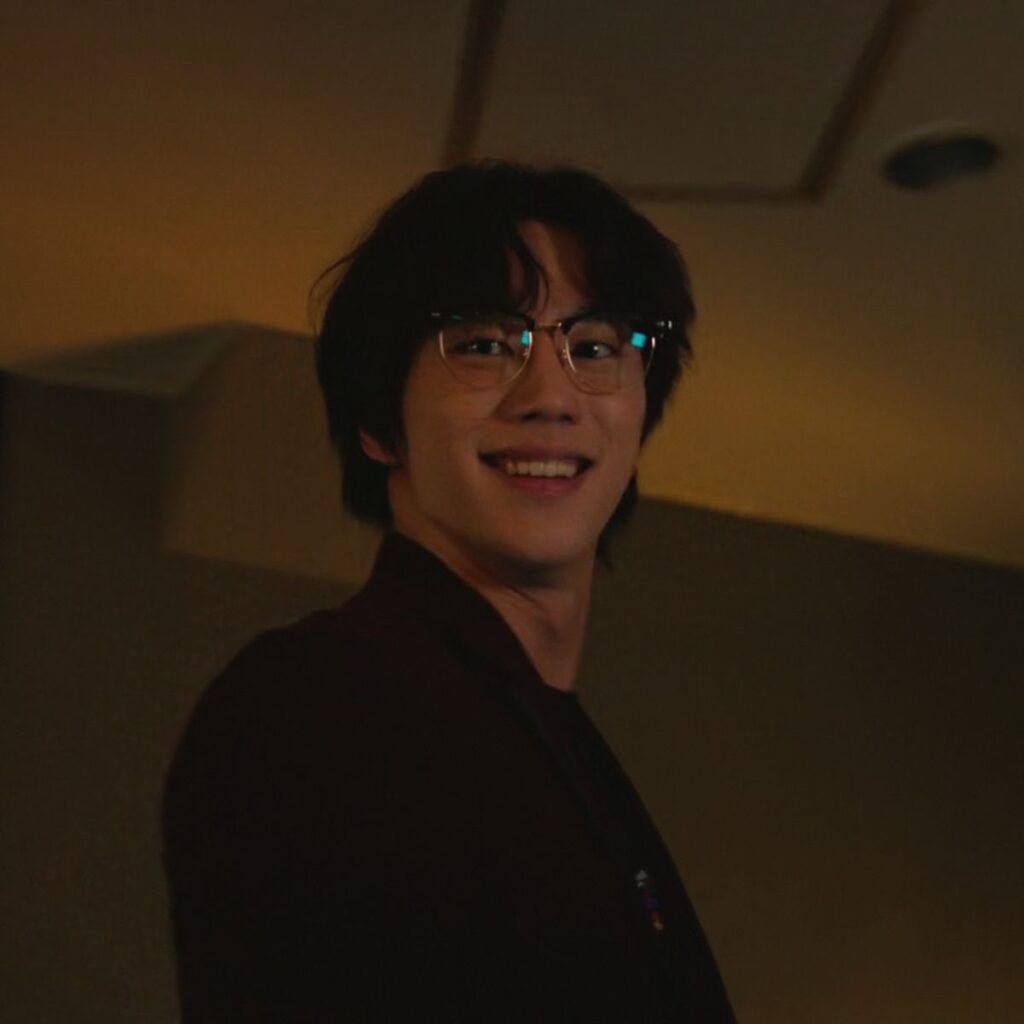
Park Ji-hoon also shared fascinating insights about working with Lee Jun-young:
I was really nervous filming with Jun-young in the bathroom. Jun-young’s punches are swift.
I could literally hear the wind from his fists.
We naturally had to film action scenes while being tense with each other. I was nervous thinking that if I lost concentration for a moment, I’d really get hit.
That day was Jun-young Hyung’s first day of filming. After filming, when he walked away with his hands in his pockets, he really looked like Geum Seong-je, the character he played.
I told him, ‘You’re really Geum Seong-je.’ His actual personality is really similar to. It’s absolutely not that his violent exterior appearance is similar. What felt similar was that he’s someone who enjoys romance and freedom.
The director’s complete faith in Lee Jun-young’s casting becomes even more significant when you learn that if Jun-young had declined the role, they would have completely rewritten the character’s narrative. The synergy between actor and character was essential to the story they wanted to tell.
Geum Seong-je: Villain or Si-eun’s Mirror?
The point I want to emphasise most about Seong-je’s character is my personal analysis that he exists as a mirror-like entity to Si-eun.
I believe Seong-je suddenly appeared in front of Si-eun as a manifestation summoned by the protagonist’s unconscious need for dopamine—something that could momentarily relieve his exhausted guilt and fatigue.
Either you die or I die
Our main character, filled both externally and internally with hellish insomnia at night, guilt about Su-ho during the day, and deep depression at his core, needed intense stimulation—the kind of ‘either you die, or I die’ intensity. Only when Si-eun was fully immersed in that stimulation could Beom-seok’s spectre, which had been cast over the boy throughout the season, making him wither, and the guilt about comatose Su-ho, finally be deflected.
So just as Seong-je needed ‘newbie’ Si-eun as a fresh dopamine source, the protagonist also needed the dopamine rush that was Seong-je.
The wolf’s backstory
Given that this drama revolves around Si-eun, there was no narrative reason for the wolf’s backstory to be revealed. If Seong-je’s role was simply to stimulate the main character enough to let him breathe momentarily and temporarily lighten Si-eun’s crushing guilt during that rooftop fight, that alone was sufficient for this character’s purpose.
If the wolf had also recited his tragic backstory, it would have just added more burden to Si-eun, whose life was already unbearably heavy. It’s rare for Korean dramas to feature villains without revealed narratives, but in this regard, Seong-je felt fresh and genuinely cool. He appears as a compelling villain and disappears just as compellingly—a mysterious existence whose true intentions remain unknowable.
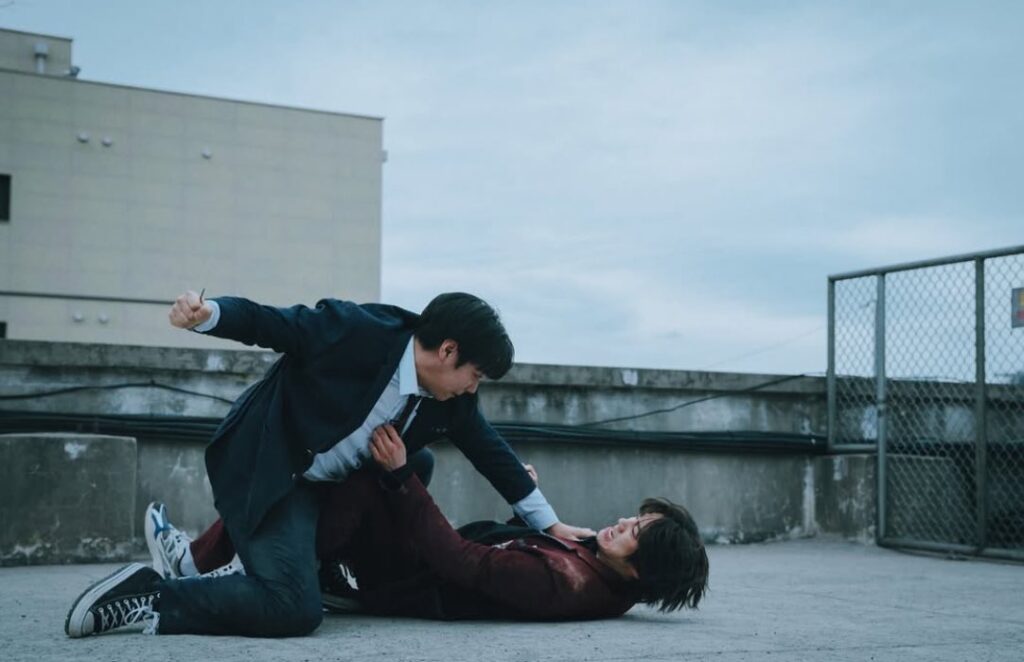
What’s Next for the Wolf?
Season 2 ends with Baek-jin gone and Seong-je positioned to become a key figure in some darker force beyond the high school union. We still don’t know whether the wolf will actually be absorbed into the Cheonggang faction or if accepting that business card was a calculated move to test the Cheonggang boss.
Season 3 might be challenging to produce, but if it happens, what role will Seong-je play? Will he continue to move through the drama as a narrative-less villain like in Season 2? Or will a backstory we never knew about be revealed and penetrate the storyline? Personally, I hope the wolf continues his enigmatic journey through Season 3, though other fans’ preferences might differ.
Weak Hero has finished Season 2 and is building anticipation for Season 3. If Season 3 materialises, it will diverge from the original webtoon completely. This means it will become entirely the creative territory of Director Yoo and the writing team—what story will they choose to tell?
- Your Reactions to The King’s Warden: From Wet Raft Scenes to Hamster Cheeks
- The King’s Warden: Hidden Details You Completely Missed
- THE KING’S WARDEN Opening Day Review: Worth It?
- The Real Weak Hero Legacy: Why We’ll Never See Our Kanu Trio Together Again (And Why That’s Okay)
- Park Ji-hoon’s “The King’s Warden” Is Coming to U.S. Theatres—And His Director Can’t Stop Praising Him
⛔️ Copyright Disclaimer: All drama footage, images, and references belong to their respective copyright holders, including streaming platforms and original creators. Materials are used minimally for educational criticism and analysis with no intention of copyright infringement.
🚫 Privacy Policy: This site follows standard web policies and does not directly collect personal information beyond basic analytics for content improvement. We use cookies to enhance user experience and may display advertisements.
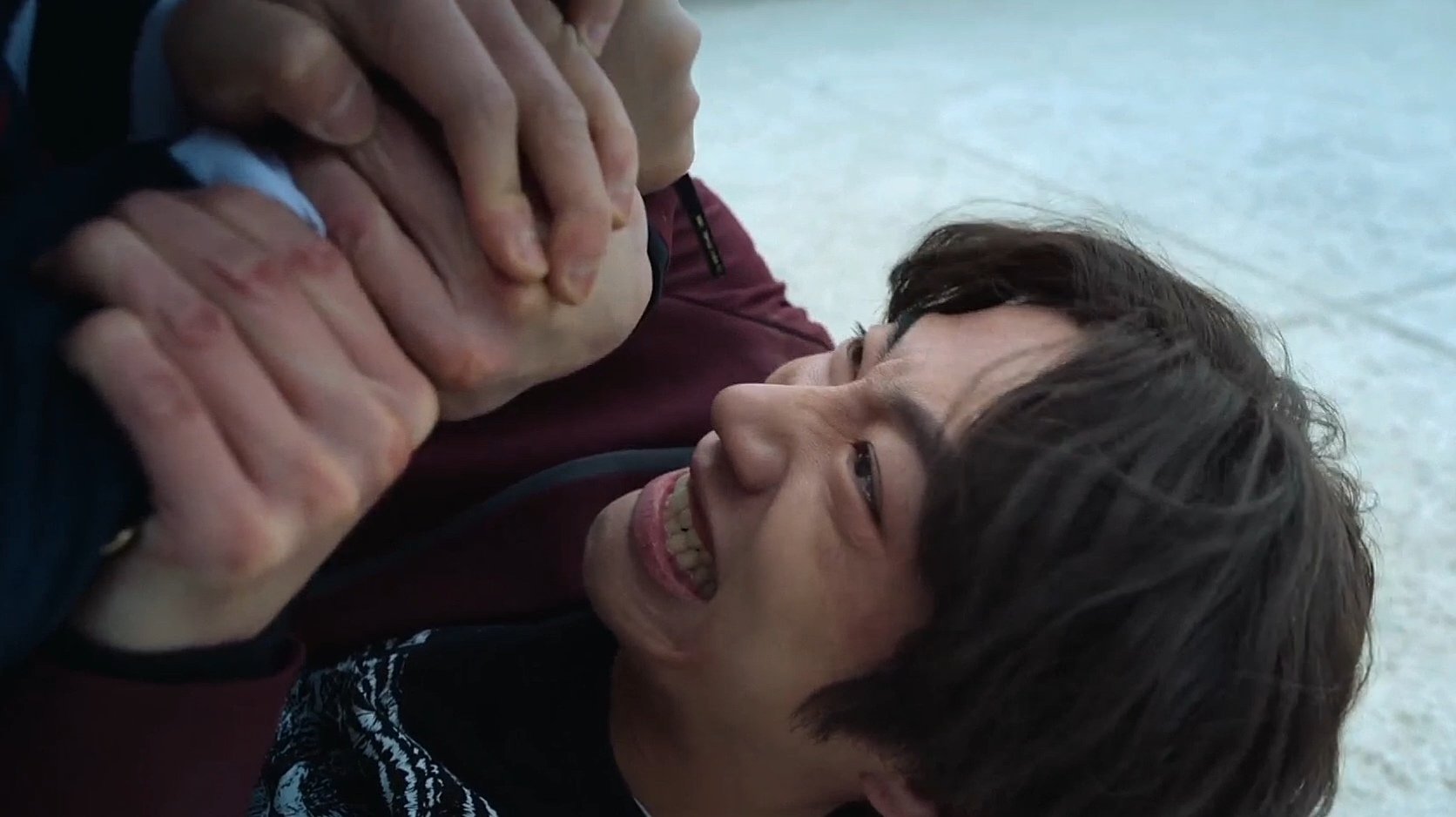
답글 남기기